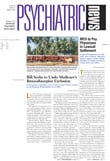The FDA's June 30 public health advisory concerning antidepressants was prompted, the advisory said, by “several recent scientific publications” that suggested “the possibility of an increased risk for suicidal behavior in adults who are being treated with antidepressant medications.”
FDA spokesperson Christine Parker told Psychiatric News that the advisory was prompted by “two papers of particular interest.” Both appeared in the February 19 BMJ (Psychiatric News, April 1).
The first study was led by Dean Fergusson, M.D., a scientist researcher at the Ottawa Health Research Institute's Clinical Epidemiology Program in Ottawa, Canada. Fergusson and his colleagues analyzed 702 clinical trials involving more than 87,000 adult patients with depression and other disorders.
Fergusson found that patients taking SSRIs were twice as likely to attempt suicide as patients in the trial taking placebo (odds ratio 2.28). However, the analysis found no increase in risk when only the number of completed suicides of patients taking SSRIs was compared with that of subjects taking placebo.
No significant differences were noted in the risk of suicide attempt in patients taking tricyclic antidepressants (TCAs) compared with those taking selective serotonin reuptake inhibitors (SSRIs).
The second study cited by Parker reviewed data from more than 40,000 adult patients in 477 clinical trials that drug companies had submitted to the United Kingdom's Medicines and Healthcare Products Regulatory Agency (MHRA). In this analysis, David Gunnell, M.D., a professor of epidemiology at the University of Bristol, England, and colleagues found “weak evidence of an increased risk of self-harm (odds ratio 1.57).” However, they found“ no evidence that SSRIs increased the risk of suicide.”
A third study published in the same issue of BMJ, but not cited by Parker, was led by Carlos Martinez, M.D., an epidemiologist in the General Practice Research Database (GPRD) Division of the MHRA. He was joined by Gunnell and others. They analyzed the course of all patients in the GPRD who had a new diagnosis of depression and for whom an antidepressant was prescribed between 1995 and 2001.
In more than 146,000 patients aged 10 to 90, Martinez and his team found that the risk of self-harm and suicide was not significantly different between SSRIs and TCAs. Children and adolescents under age 18 who were prescribed antidepressants were at increased risk for self-harm (odds ratio 1.59) compared with peers who had not been prescribed one of these medications. However, no increased risk was seen in any older cohort.
Darrel Regier, M.D., M.P.H., director of research at APA and executive director of the American Psychiatric Institute for Research and Education, noted when the studies were published that the findings were difficult to interpret. Fergusson's finding of a twofold risk of nonfatal self-harm in self-reported adverse events but no increase in completed suicides“ remains difficult to interpret and deserves additional study,” Regier told Psychiatric News in March.
Gunnell's findings of “weak evidence of increased risk of self-harm and inconclusive evidence of increased risk of suicidal thoughts,” Regier added, “illustrate the contradictory nature of findings coming from these studies.”
